Football
The Rundown: What Mike Gundy Said at His Pre-Kansas News Conference
Gundy talks rebounding from the massacre in Manhattan.
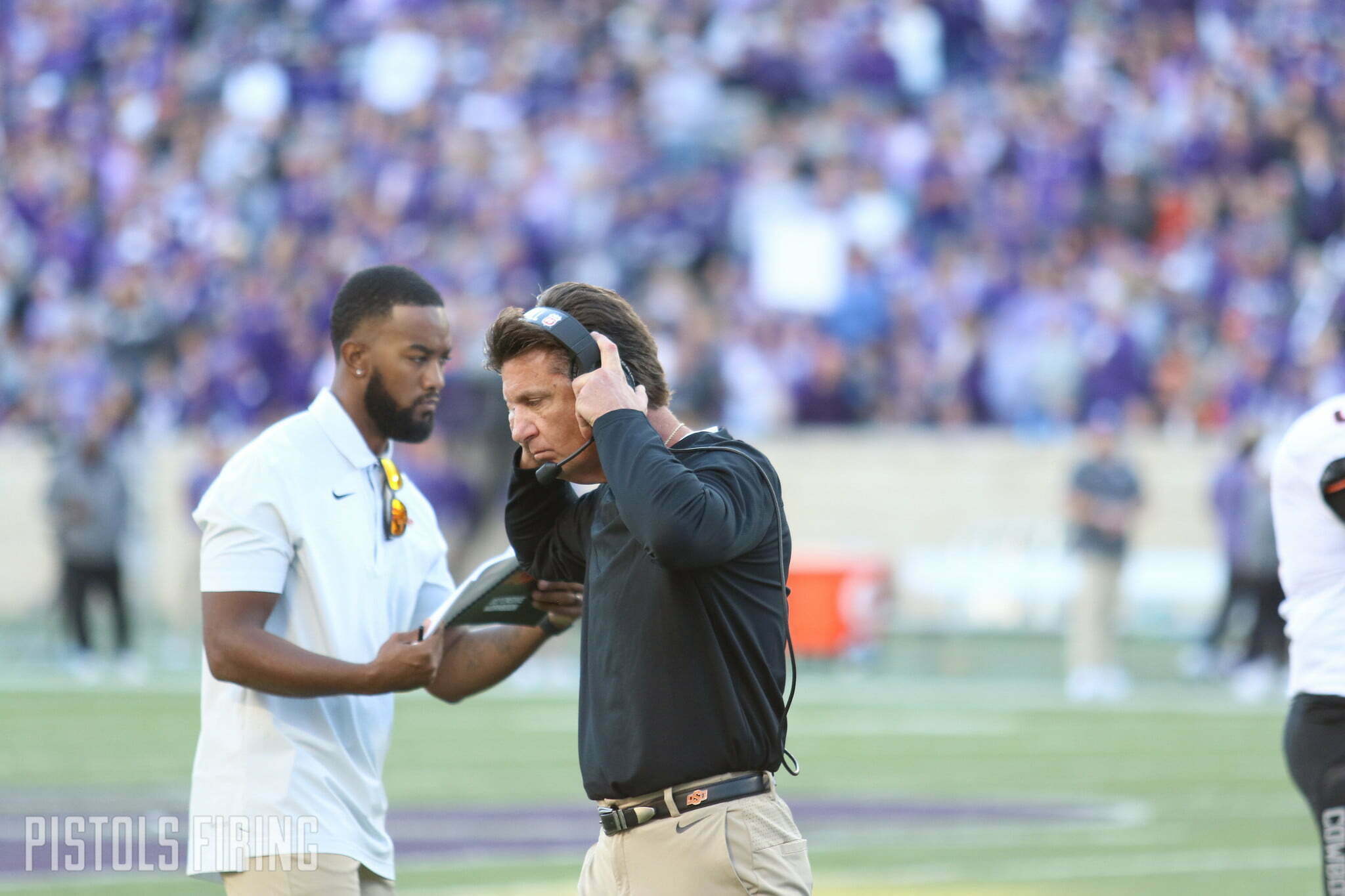
STILLWATER — Despite getting blistered 48-0 this past weekend, Mike Gundy and his Cowboys are “back at it.”
Gundy held his weekly media luncheon on Monday. Here is what he said.
Opening statement
“I was pretty accurate afterwards in the game. I didn’t want to commit to a lot, but they outcoached us, they outplayed us, they were more physical than us in the last game. We weren’t ready to play. I didn’t do a very good job getting our guys ready. But we finished all that yesterday and went through all tape and meetings and such and practiced last night. Back at it today, and ready to roll for this week.”
On how he handles this week of practice
“Well, we’re gonna practice like we’ve always practiced.”
On what it takes to refocus for Sunday’s practice
“One thing I think that we have accomplished here from longevity and long-term culture is, I tell them the same thing after every game. Sometimes we go out to eat or spend time with whoever, girlfriends, family, whoever, and it’s enjoyable. And then we come back Sunday and we go to work. Or sometimes we don’t or we could and it’s not as enjoyable, but we still have to go to work Sunday. And that’s what I saw from the guys last night. If there’s anything that I’ve learned in doing this a long time is to be very honest with the players always is the best option, and that’s what we did yesterday — and with ourselves as coaches.”
On what he did differently in practice last week
“We altered several things. I had concerns about, as I mentioned up there, kind of who we had left. And there’s a lot of different ways to handle this as a coach and different philosophies, but one consistent philosophy for most coaches is when you show up Saturday, you want to have as many guys as you can have. I was a little more concerned than maybe I should have been about where we were at from an injury standpoint.”
On the team’s emotions at Sunday’s practice
“You know, all these questions are good and they’re fair, but guys, I’ve been doing this 18 years. We’ve won as many games as anybody in college football over the last 10 or 12 years at a very, very high level. We didn’t play good. We didn’t coach good. And they played really well for what they were trying to accomplish. Chris (Klieman) is a good guy, the coach. And like he said after the game to me, he said, ‘I don’t know we could have played a more perfect game against you all.’ And I said, ‘Well, you picked a shitty day to do it.’
“But I’m just gonna tell you guys the way it is: I’ve been doing this a long time, and I think we have good relationship the last two or three years. I’m pretty honest with you guys about everything. They physically whipped us, and they out-coached us, and they had better plans than we did. And I didn’t do a good job of preparing us. Now, that doesn’t answer your question. What your question is — They’re fine. They’re kids. They’re fine. Are they as excited as they were after we played Texas? No. But that’s life. That’s what we do, right? We’re gonna have things for the rest of our lives that we’re like, ‘That’s not very fun,’ or ‘That was awesome.’ I tell them sometimes, it’s like a day trader or a financial adviser, an investor, and he put money in Amazon 10 years ago — he’s fired up. The guy that put money in something else that’s not doing good is not very fired up, but he still has to continue, if he has more money left. But the point being is they’re fine. The coaches are a bigger problem than the players because there’s more of an emotional strain on them. It’s their life, it’s there every day, it’s their kids, moreso than the players. They kind of get through stuff quicker based on the way the world is. I’ve seen a bunch of them in the office today, watching tape, I expect them to come back and practice really well tomorrow. We practiced good last week. We just didn’t do some of the same stuff, and I don’t know, maybe that wasn’t as big a factor. I don’t know. I mean, I had to come up with something based on not playing very good and not coaching very good.”
On what he did after the game Saturday
“When I got home, I don’t eat lunch on a Saturday. I always have the nervous stomach and butterflies, so I don’t eat much. Generally after a game, we win most of the time, so then I feel like I’ll eat everything in sight. I think Mac Brown is the one who said he fires up a couple of double-cheeseburgers after a game, right? I think he’s the guy that said that. That’s kind of the way we are. So I just grabbed a little bit to eat and then I go to bed just because I don’t want to sit there and watch a TV of the game and watch my score go across the bottom when we got our ass kicked. I’d rather watch the week before — butt kicked, I was trying to not cuss, butt kicked. But the point being is that’s what I do, and then I’m up, you know, 3:42 [a.m.]. I came to work at 4:17 [a.m.], worked all day and watched every single play, watched every play on offense, watched every play on defense, watched every play on special teams and then start doing all the other stuff. Then practiced last night, went home about 8:30 or 9. My routine doesn’t change much. It’s just not as fun.”
On when things dawn on him that he should’ve done something differently in a game like Saturday’s
“Well, I mean, the issue we had is when you got down three-plus, even four scores vs. a three-down team that plays back a lot challenges can you ever get back in the game enough. The clock is not your friend anymore. Is there enough time to accumulate plays based on the way they play. That’s when it starts to become concerning. You deal with that, and you don’t want to overdo it because you can’t become somebody or not. The flip side of that would be some teams that are really good ball control — I’ll use all use the military schools — if they get down three touchdowns, probably not good because it works against what they’re built for. So, once that happened, then we have to start trying to rally in different ways and obviously it didn’t work very well.”
On OSU not being able to run against K-State’s three-man defensive front
“You know what’s interesting, like for example, I did some three-down study like you do. The guys that are playing three-down in this league are giving up fewer rush yards than the four-down guys.”
On what he does to get the run game going
“We can’t change what we do. We’re gonna run the plays we run. In midstream, you don’t change who you are and what you do. One of the issues, I was just talking about, was when you fall behind by multiple scores like that, you almost become one-dimensional, so it’s even more difficult. Sometimes people would say, ‘Well, it’s easier to run the ball if you’re that far behind because they think you’re gonna throw it.’ Not always because you’re getting a lot of different junk up front. And that’s stuff that you don’t practice a lot. So, we can’t spend a lot of time just practicing what I call junk stuff and not practice base stuff, and then when teams get ahead, you can dial plays as a coordinator on both sides of the ball because you’re not worried about, ‘Well, if I mess it up, doesn’t make a difference. I’m still up by three touchdowns.’ So it gives them a lot more free will. Then they come off their call sheet, which is what your coordinators are basing their calls on is what their call is on in certain situations, and in most cases they’re already off their call sheet. So, there’s a lot of things going on.”
On Deondre Jackson
“He ran the ball well — played hard, competed.”
On Deondre Jackson’s pass protection
“It was OK. It was certainly something that we can work with, but he’s a guy that we were excited about what he brought to the table in that game.”
On why the running game has been stagnant in recent years
“I think some of it — we’ve had multiple guys playing different positions up front in the last few years unfortunately. We went through, I guess ’09 up through about, I don’t know, I can’t remember my years, ’16, ’17, ’18 where we really were healthy up front with our five guys pretty much every game. So, they learned to work together and make calls, and we don’t have to move one guy. Like, we took (Jason) Brooks and played him at guard — played good, played a good game. He has not played guard before [at OSU]. Might have found something out we didn’t know. I think the consistency of the five guys up front really helps a lot. And we’ve managed. Our running backs averaged 4.4 yards a carry against Texas, which I was thrilled with that. It was better than what it had been. So we’ve shown some glimpses of getting better at it, but if I had to say what’s causing it, it would be that we just haven’t had the five guys consistent there, working together. Those guys need to kind of be in sync.”
On if having continuity at offensive line coach would help
“I don’t think so. I think a lot of times coaches use that as an excuse — head coaches do. Like, we could look at first-year coaches. … The guys at TCU, they’re not having any problem their first year. So, I think some head coaches just kind of use that as an excuse. We hire coaches that know what they’re doing and are experienced, and they go through spring football and they have August. I mean by then, we ought to have it kind of coached up.”
On Kansas
“Well, he [Lance Leipold] has done well everywhere he’s been. He’s a good football coach, and I told you guys last year before we played them, I liked their concepts, I liked their schemes. They were in games and had something go wrong at the end and could have won. Could have been OU last year, right? [Caleb Williams] makes a play on 4th-and-3 and scores or if they get him, he’s down in the backfield, they can run the clock out and beat them last year. So, they had progressed as they went on. Their quarterback is really active, doing a really good job, throwing it, RPOing it, running it. They’re motioning and getting to what I call triple option with an RPO off of it. Doing some different things, and they’re playing hard. Got to play well to beat them.”
On Kansas’ defense
“In most cases, if you’re winning a little, you run to the ball. If you’re just losing consistently, year after year after year and game after game, you don’t run to the ball.”
On whether the approach changes after last week in not knowing who Kansas’ starting quarterback will be
“We prepared the same way. Whoever they played quarterback would be the same for us. It would be the same for Kansas. I got bad information last Monday on who was playing, but that didn’t have anything to do with us not playing well. They’re running in the same plays with both of these quarterbacks.”
On how much OSU’s offense changes whether Spencer Sanders or Gunnar Gundy is at quarterback
“Not much. With Shane (Illingworth), Shane couldn’t really maneuver, and he’s not going to hurt you running the ball. The guys that we have here, all of our guys practice the same way, practice the same plays. Very similar Kansas. So if you look at the games that the other quarterback played in, just recently, they’re running the same plays and we run the same plays.”
On how Spencer Sanders is doing
“I hope he’s doing good. We’re gonna rest him some this week and try to get him back, get him going, just like we’ve been doing.”
On the Big 12’s new media rights deal
“Well, that’s one thing I was right on. I said he would do it. This conference will be fine. Oklahoma State will be fine. From Day 1, I mentioned that. I said Oklahoma State would be fine. I didn’t know anything about the new teams coming in, but I knew we were in good shape. And then once the new teams came in, I knew that we’re in great shape. And then once we hired [Brett Yormark], I even felt better. And he secured it — however much more for, what, six years.
“Well, that’s one thing I was right on. I said he would do it. This conference will be fine. Oklahoma State will be fine. From Day 1, I mentioned that. I said Oklahoma State would be fine. I didn’t know anything about the new teams coming in, but I knew we were in good shape. And then once the new teams came in, I knew that we’re in great shape. And then once we hired [Brett Yormark], I even felt better. And he secured it — however much more for, what, six years. I didn’t pay attention to I need to tax 31 Yeah, so it starts at 25. So So “Six years, which that’s kind of what we talked about in here, I felt like we would be a short-term, well short-term media deals, because normally they try to grab a 10-, 12-, 15-year deal. But because it’s new, and there’s new teams, it makes sense for ESPN and FOX to not want to say we’re gonna buy a 12-year deal. ‘OK, we’ll do a five- or six-year deal. We’re going to pay you more money.’ [Yormark] is a big time wheeler-dealer negotiator, and from Day 1 that I talked to him, I knew we were in great hands. So he secured us all the way through ’31 and I’m gonna guess at ’28ish or something, I’m not a business guy, so I don’t know, but he’s gonna go back in and do it again, and it’s gonna be better.”
On the Big 12 being only conference with ESPN and FOX as media sponsors
“Pretty good I guess. [Brett Yormark’s] job is to make big money for the schools. That’s what he did.”
On the Kansas game not being easy like past years
“You know what’s interesting with them, we talked about what you just brought out. There’s been a number of teams over the years go up there and play there, when they were struggling. We can call it like it is and not play very good. I mean, I’m sure you’ve been there enough times following [Oklahoma] and following us when we were pretty good and you looked at the scoreboard and there’s three minutes to go in the third quarter and it’s 24-17. And I’ve been there a number of times with what I would have considered on paper, a considerably better team and we weren’t playing very good. One year Tyreek (Hill) had to return a kickoff to give us the lead I think, or maybe it was tied. I don’t remember. Then last year they were making strides, in my opinion, and I thought they had really good schemes. In my opinion they were well-coached. They just couldn’t turn the corner in certain cases. And then this year, we saw that carryover, the quarterback was making a lot of plays, running some counter, triple-option, RPO stuff, it’s not easy to deal with. And the quarterbacks willing to run and willing to get hit, so you have to defend him. And then you start to win a little bit, now everybody chases the ball and trying to make plays and having fun. And instead of 12-15,000 people coming to the game, now they got 40-45,000 or whatever they’ve averaged. It doesn’t take long. So, it’s really good for our conference and not as good for the coaches, because you got to go up and play well.”
On the parity in the Big 12 making it hard to get a team in the College Football Playoff
“Getting an undefeated team is gonna be hard. Getting in is going to be easier because there’s 12 (teams), right. So, the 12 helps everybody across the country. I would really doubt that the major conferences in the country won’t get a team or two in when you go to 12. The unbeaten teams based on the way it is now, there is some adjustments going on with the portal, there are some boundaries that are trying to be set with NIL right now. I don’t know if any of it’s concrete yet, but if that continues on the way it is, we’re in the NFL basically is what we’re in. So, the parity of the NFL is same. When I got home last night I saw, I didn’t see any of it, but I saw the score — the team that won the Super Bowl last year has got a losing record. That’s the NFL. That’s what’s trickling down to this level with the parity week-to-week based on free agency, which is the transfer portal, and NIL, which is incentives with money. So it’s balancing out.”
On his comfort level with Gunnar Gundy operating the offense if Spencer Sanders cannot play
“The comfort level is never going to be the same as it is with a guy that’s played three or four years. The guy at Kansas State has played a considerable number of games. He’s older, he’s experienced. So, I think it would be unfair for me to stand here and say my comfort level with either of the two quarterbacks that we would use would be the same with [Spencer Sanders], because it’s not. They’re inexperienced, they’re learning on the run. I’ve seen them execute in scrimmages, I’ve seen them do things in the indoor, but it’s different when everything, when the lights are on and people there. We all know that. That’s just athletics. So we would learn on the run somewhat. Do I think we can function? Sure we can. Do I think that we function the way we do with Spencer? No, because of his 40-something games of experience and being in those situations.”
On whether Oklahoma State would have to run wildcat offense to try and function if Spencer Sanders is unable to play
“No, I just don’t believe in that. I’m not saying it’s wrong. I didn’t watch [Oklahoma] against Texas when we were getting ready to play because of what I had heard, so I just didn’t have interest in watching it. I didn’t think it fit what we did. So I have not seen that. I haven’t seen any of it. And I’m not saying it’s wrong. But, that’s not something that I believe in. I think that we practice plays. We have guys that have practiced, they need to run the place that they practice. We need to run the plays that we practice and try to execute those. I think when you reach for stuff, you’re asking young people to do things that they lose a comfort zone in and they may not be as productive but that’s just my opinion.”
On whether he said anything to Gunnar Gundy after the interception late against Kansas State
“I didn’t have to. He came to me and apologized. I said, ‘You don’t need to apologize to me, you need to apologize to the team and your coaches.’ I mean, I just stand there and watch it. And I don’t have anything to do with that. But, I know that there are times, sometimes he’s a freelancer. He did stuff like that in high school, and he’s done it here. He’s done it at this level in scrimmages and games. But, I think that he learned the lesson in a good way that this is a different game. And you know, sometimes you see things like that you see guys do that all the time. You see quarterbacks do that, but there’s a time and a place and one of them’s not in the middle of the field. That’d be my suggestion. When you’re out running by the sideline and you can see what’s going on and something happens, that’s different. But when in the middle of the field, wouldn’t be a good suggestion”
On how Gunnar Gundy played
“He did okay. From an evaluation stage, we’re down 40-something points, you know, they’re in pure drop. So there’s some minimal evaluation going on. But he functioned and knew where to go with the ball, made throws. Tried to throw one out cut over the drop player’s head, which you know, he would probably tell you that, ‘I could have made that throw but maybe not now.’ So there are some things that he did good and there’s some things that he learned.”
On whether there is a time when a coach needs to overrule a veteran player wanting to stay in the game
“Yeah, there can be a time, and I could have done that.’ But I’m gonna lean toward experience, longevity, veteran, whether it’s [Spencer Sanders] or Brock Martin, or Malcolm Rodriguez. They want to go in and play, ‘Coach I want to play.’ They’ve earned the right to do it. Now, I could have, you know — well, we took him out because of just what you said. I guess maybe you’re asking me, could it have been 10 minutes earlier? I mean, we could have. But he’s different with that. And his demeanor, and the way he’s handled himself has been fabulous. So I didn’t want to start a storm that didn’t need to be started. I had a big enough storm going on, and I didn’t want to start one with him. And so at some point, we said, ‘Hey, there’s no reason to send you out there.’ Could we have done it earlier? Sure. Should I have? Probably. Probably should have said, ‘Hey, no. You’re not going out.’ But I tend to lean toward the experience and the longevity of those guys.”
On how much pressure is on Gunnar Gundy if and when he is the starter
“I think he’s got more pressure. I’ve told him from Day 1, and the way I look at it is this, I evaluate practices, I evaluate gameplay, and one of the most difficult things to do with all of us that have had kids is to make a decision that maybe not favor your kid, when that’s not a natural human instinct, but that’s what I have to do. And I can listen to other coaches and such. Would there be more pressure on him? Sure. Unjustifiably unfair? Probably, but it is what it is.”
On whether his relationship with assistant coaches is strong enough that they are honest about Gunnar Gundy
“I think it would be tough on them, but I’ve been with [Kasey Dunn] 100 years and I have a great relationship with Tim (Rattay) and so we’ve watched it now for a year and we watched it through the spring, we watched it through the fall and you know we’re in this situation we’re in based on kind of where we’re at. You know, we’ve got another young quarterback in this program, (Garret Rangel), who is really good too. I mean, he’s a good player. He doesn’t have any experience either. But from what he’s shown us in practice and scrimmages and stuff, we feel good about him. So you know, hopefully Spencer (Sanders) will play, because obviously that’s a different level. But if [not], then we go through the path that maybe you’re talking about and we figure it out, we go play and see where it goes.”
On whether there would be a priority to go for it on fourth downs if Tom Hutton is out
“Logan (Ward) is our backup punter and punts really good. I feel comfortable with him coming in and punting. Now, he’s inexperienced. Kind of the same thing we were talking about with quarterback. Little bit different than quarterbacks because it’s more magnified, but I feel good about Logan if he has to come in and punt. He’s gone good job at practice and worked hard, done a good job, and I’m comfortable with him.”
On how his team has handled getting off the field when an opposing crowd rushes the field
“You know, when I first started coaching here we never had that problem because when people beat us they just thought that was the way it’s supposed to be. And you know, what’s interesting now is, and I don’t think — I forget about it. When the game is over I’m going to hustle out, tell them, ‘Good job,’ and all that, then I forget about it, then it becomes an issue because I’m trying to get out of there, students are fired up, they’re wanting to nag on me. You know, ‘Nice mullet. Your team sucks,’ all that stuff. I’m just trying to get out of there. I’m for ’em. You know, great job. I think that’s awesome, but I think our guys have done a great job. That is a little more high risk (for an altercation), and I’ll tell you why, because you have people on the field that have in most cases probably had a cocktail or two. But people make poor decisions in that situation, and they’re just kids having a good time. They’re fired up their team won, but they can make a poor decision. We get bumped into and hit, whatever. They always get bumped, it’s accidental. You just hope that the kids understand, hey, they won, let’s get to the locker room and hit the road.”

-
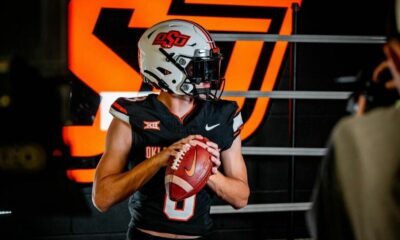
 Football4 days ago
Football4 days agoFour-Star Quarterback Adam Schobel Commits to Oklahoma State, Flips from Baylor
-
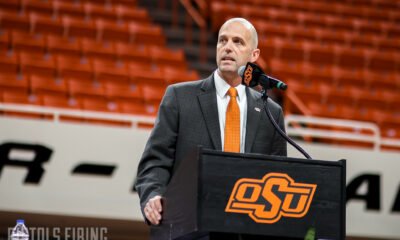
 Hoops4 days ago
Hoops4 days ago‘Keep Turning Over the Rocks’: Looking at the Portal Landscape as Lutz Looks to Solidify His First OSU Roster
-
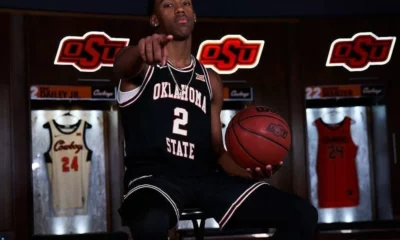
 Hoops4 days ago
Hoops4 days agoFour-Star Signee Jeremiah Johnson Reaffirms Commitment to Oklahoma State after Coaching Change
-
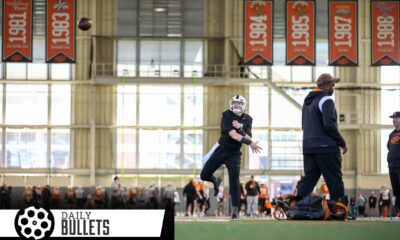
 Daily Bullets3 days ago
Daily Bullets3 days agoDaily Bullets (Apr. 23): Pokes Land Four-Star Quarterback, Retain Talent from Mike Boynton Era






